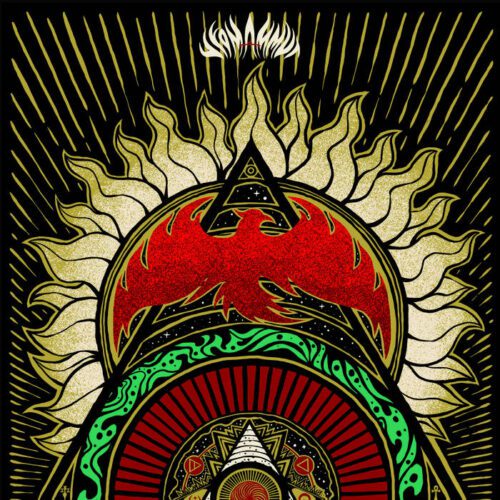By Levi Gogerla
One thinks of rebirth from ashes when one thinks of a phoenix rising. Heavy psychedelic musicians Ufomammut’s newest record Fenice represents a form of rebirth, not just thematically for the drone heavy triad of musicians: Poia, Urlo, and newest member Levre, but also metaphysically, as the band shifts in style, exploring a new age of sonic tonality from the trios post-pandemic creative ‘depths.’ It is a record of renewal for the band with bellowing reverb and sub-nautical bass-heavy chasms that drives listeners to navigate them hypnotically riff by riff.
There’s freedom in this new record for the Italian doom metal band to experiment. Wails from the walls of synthetic noise characterized by dark dungeon-crawling synth and droning vocal deliveries showcase Ufomammut where they are most comfortable. Progressive riff arrangements dive into monstrous lengthy jams carried on repeated notes and driving arpeggios. Ufomammut, a band whose music has always been characterized by its ability to transform genres through a blend of different compositional approaches consistently stays attuned to its core driving principles.
Fenice is a record that came quickly to the musicians—written during the Covid 19 pandemic the songs are helped to shape with new drummer Levre, bringing an almost punk-like ferocity to the custom tube amplifiers and full-size cab drone of Poia, and Urlo’s signature guitar and bass distortion.
Written as one long track, Fenice separates itself into six ‘shorter’ parts but should be ingested whole if possible. The vast valleys and canyons in an Ufomammut record blend in a haze-like kaleidoscope of different psychedelic and spaced-out influences. Eight albums deep, Fenice continues Ufomammut’s impressive escapade into the very depths of riff worshiping vintage doom tone—consistent with the genre titans. Fenice is a continuation of something cosmic in scale, gargantuan in influence, and a continuous reinvigoration of ‘the riff’ in doom metal music.
























